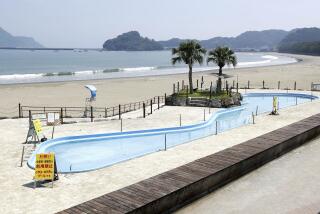COMMUNITY COMMENT : Kobe Quake ‘Might Have Opened Japan to the West’
- Share via
The 6.8-magnitude earthquake in Japan on Jan. 17 captured the world’s attention: 5,462 dead and the city of Kobe devastated. With hard work and patience, people there have begun to recover: Homes are being rebuilt; businesses are resuming normal operation and grief is subsiding. But I predict the biggest shake-up has yet to be felt.
The upheaval I’m talking about has nothing to do with the shaking of the Earth’s crust, but rather with a new way Japan views its global neighbors.
Many of my friends and associates are speculating that the quake might have radically opened up Japan to the West, accomplishing in a few minutes what would have taken diplomatic efforts a hundred years.
The catalyst for this tremor was the tremendous outpouring of foreign concern and assistance, especially from the United States. Having lived in the United States for half my business life, I’ve seen how Americans respond in a crisis, how generous they are.
It’s as if there is something in the water here that allows people to know intuitively when they are needed and how they can help. In spite of the great diversity of the population, Americans act as one when they hear that call.
But the speed and magnitude of the response to the quake were overwhelming even to me.
In less than four hours from the moment of the quake, a telephone hot line was established to take donations. My own telephone rang constantly that morning with offers of help from our subsidiaries, employees and business associates across the country. The next morning I was at Claremont College and everybody stopped for a moment of silent prayer. An executive at a meeting in Washington said that group also shared a prayer for the quake victims. A single church in Southern California collected $32,000 on one Sunday morning and various clients and customers offered long-term support for one or more of the 1,100 quake orphans.
Believe me, the people of Japan are not simply grateful. Many are stunned. I don’t want to overgeneralize or stereotype Japanese people, but there is an undeniable “us against them” mentality lingering from our past.
Remember, Japan is relatively new on the international multicultural scene. While America was taking its place among nations, Japan was locked up in a 300-year period of total isolation. Even in the modern era, while America was experiencing history’s greatest buildup of cultural diversity, Japan was building up one of the greatest barriers, which ultimately collapsed in 1945.
Much has changed in the past half century. But the Japanese psyche is still sometimes guided by mistrust of outsiders and an island’s fear of being denied resources. So imagine the surprise of many people when the whole world opened their hearts to Japan in its time of need.
I’m just old enough to remember a similar situation after World War II, when the economy that was to one day become one of the world’s strongest was in complete shambles. Americans helped us rebuild, and only through their generosity was Japan able to organize the skills and resources to get back on its feet.
Because we have achieved so much, perhaps some have forgotten that we owe a great deal of that success to the generosity of others. Perhaps we have been sleeping, but the international response following the Kobe quake was a very loud wake-up call.
More to Read
Sign up for Essential California
The most important California stories and recommendations in your inbox every morning.
You may occasionally receive promotional content from the Los Angeles Times.













